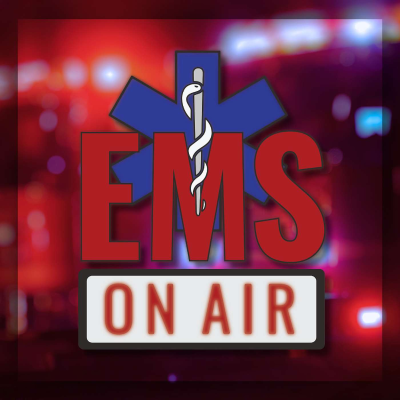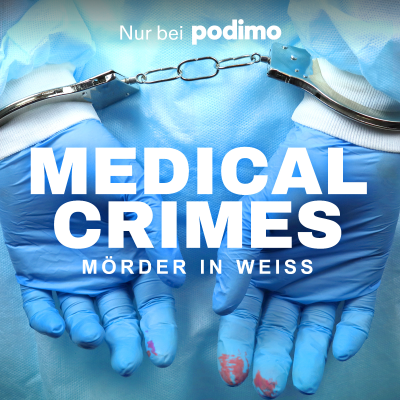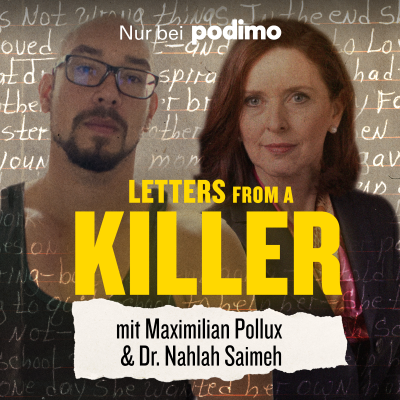
EMS on AIR Podcast
Englisch
Kostenlos bei Podimo
Kostenlos hören bei Podimo
Starte jetzt und verbinde dich mit deinen Lieblingspodcaster*innen
- Vertraut von über 1 Mio. deutschen Hörer*innen
- Über 1.000 lokale Podcasts und Shows – nur bei Podimo
- Keine Zahlung nötig
Mehr EMS on AIR Podcast
EMS on AIR is an education and entertainment podcast designed to keep healthcare providers safe, informed, and prepared. The EMS on AIR Podcast was originally launched in response to the COVID-19 pandemic as a way to communicate efficiently and directly with EMS personnel. Now, we’ve started branching out to all things healthcare but still tailored with the national EMS audience in mind. This podcast has begun to transform into a bridge between subject matter experts, the most recent data, and the EMS providers who make a difference every day in the field.The EMS on AIR Podcast is hosted by Geoff Lassers and Dr. Robert Dunne. Geoff Lassers began his career as a first responder in 2002. Since then, he has earned a depth of experience as a professional firefighter, paramedic, EMS instructor, and in the hospital as an ED tech. Geoff has been a professional firefighter/paramedic and EMS instructor with the West Bloomfield Fire Department since 2004. In 2020, the EMS on AIR Podcast was launched to provide up-to-date information to the local, state, and national EMS community regarding the COVID-19 pandemic, as well as express best practices. Since then, the EMS on AIR Podcast has expanded to all topics related to prehospital care. Robert Dunne, M.D., FACEP, FAEMS, is an Emergency Medicine and EMS physician located in Detroit, Michigan. Dr. Dunne is currently the EMS Medical Director of the Detroit Fire Department, as well as a professor of Emergency Medicine at Wayne State University, and directs the School of Medicine’s pre-hospital programming, including Emergency Medical Services, Preparedness, EMS Research and more. He is also program director of the Emergency Medical Services fellowship. Additionally, Dr. Dunne is the elected medical director of the Detroit East Medical Control Authority, the local version of the state-designated entity that supervises all pre-hospital care in Detroit and eastern Wayne County.
Alle Folgen
81 FolgenCyanide Toxicity Case Study
In this episode of the EMS on AIR podcast, retired Battalion Chief Doug Burke shares his firsthand experience with cyanide poisoning during a fire incident. Despite wearing full PPE, Burke encountered cyanide toxicity due to the hazardous materials present in the burning structure. This episode offers critical insights into the risks associated with modern firefighting, the importance of early symptom recognition, and the necessity for fire departments and EMS agencies to be prepared with treatments like Hydroxocobalamin. The discussion emphasizes the importance of prompt intervention to safeguard both firefighters and victims from life-threatening exposures. Support the show [https://www.patreon.com/emsonair?fan_landing=true]
Fireground Resuscitation with Dr. Robert Dunne
In this episode, we welcome Dr. Robert Dunne, who is the EMS Medical Director for the Detroit Fire Department, as well as the Detroit East Medical Control Authority. Dr. Dunne is here to describe why fire departments and EMS agencies should be prepared to treat patients with smoke inhalation injuries. Specifically, Dr. Dunne is here to put a spotlight on the toxic twins, cyanide (CN) and carbon monoxide (CO), which are two major contributors to the injury and death of smoke inhalation patients. During this episode, Dr. Dunne will describe why fire departments and EMS agencies should be prepared to treat patients with smoke inhalation. In addition, doc will describe the impact of cyanide (CN) and carbon monoxide (CO) on the human body. Then, he will list and describe the assessment and treatment priorities for smoke inhalation injuries. Finally, Dr. Dunne will describe the benefits of hydroxocobalamin for patients with signs and symptoms of cyanide toxicity. Support the show [https://www.patreon.com/emsonair?fan_landing=true]
A thoughtful approach to fluid resuscitation with Dr. Mark Piehl and Dr. Peter Antevy (recorded April 27, 2022)
In this episode, Dr. Mark Piehl and Dr. Peter Antevy discuss why EMS must adopt a more thoughtful approach to fluid resuscitation for critically ill or injured patients. Specifically, patients in shock. It turns out that EMS needs to take a more of a proactive approach to recognizing the need for and administering fluids for certain patients. Dr. Piehl, and Dr. Antevy are here to put a spotlight on the value of fluid resuscitation in the pre-hospital setting, walk us through the data, and discuss the how EMS can provide the right amount of fluid in the right amount of time to make a big impact for our patients. Dr. Peter Antevy is a Pediatric Emergency Medicine Physician, as well as an EMS Medical Director for several fire-based EMS agencies in South Florida. Dr. Mark Piehl is a Pediatric Intensivist at WakeMed Health & Hospitals. He is also the Assistant Medical Director for WakeMed Mobile Critical Care, and an Associate Professor of Pediatrics at the University of North Carolina School of Medicine. On top of all that Dr. Piehl is the Chief Medical Officer and Co-Founder of 410 Medical, Inc. as well as the inventor of LifeFlow. LifeFlow is a device used to deliver rapid fluid boluses or blood transfusion for patients with signs of shock. Visit 410medical.com for more information about LifeFlow. Click here for access studies and information that support the information expressed in this episode: https://drive.google.com/drive/folders/152po79RnJcXI53-AlxRsoUKbH_ODnqDh?usp=sharing [https://drive.google.com/drive/folders/152po79RnJcXI53-AlxRsoUKbH_ODnqDh?usp=sharing] Please keep emailing your questions, comments, feedback, and episode ideas to the EMS on AIR Podcast team by email at Geoff@EMSonAIR.com Visit EMSonAIR.com [http://emsonair.com/] for the latest information, podcast episodes and other details. Follow us on Instagram @EMSOnAIR. Geoff Lassers, Paramedic I/C, AAS. Host/Producer, EMS on AIR Podcast Firefighter/Paramedic, West Bloomfield Fire Department EMS System Manager, Oakland County Medical Control Authority Director of Sponsorships, GuardianCME.com Geoff@EMSonAIR.com [Geoff@EMSonAIR.com] Support the show [https://www.patreon.com/emsonair?fan_landing=true]
EMS, STEMI, and e-Bridge (recorded March 10, 2022)
During this episode, we welcome Nathan Stanaway, MS, NRP and Alina Capatina MSN, CCRN-K, CNL. These skilled process improvement professionals discuss the strengths and potential roadblocks of integrating a new app that supports EMS when they notify the hospital of an incoming STEMI patient. Nathan Stanaway is the Senior Manager of Mobile Care EMS, Critical Care Transport, and AHA Training Center at Baystate Health. Alina Capatina is the former STEMI Program Coordinator at Baystate and has since moved on to the Operations Excellence Department. In recent years, Alina and Nathan were directly involved in the implementation of e-Bridge into their system. Specifically, their focus was on maximizing care for STEMI patients being transported by EMS. For scale, Baystate Health is the biggest and busiest STEMI program in Massachusetts. They receive upwards of 400 STEMI patients per year from the field and from 10 sending facilities around the region. To them, the importance of EMS in STEMI care is obvious. Please keep emailing your questions, comments, feedback, and episode ideas to the EMS on AIR Podcast team by email at Geoff@EMSonAIR.com Visit EMSonAIR.com [http://emsonair.com/] for the latest information, podcast episodes and other details. Follow us on Instagram @EMSOnAIR. Geoff Lassers, Paramedic I/C, AAS Host/Producer, EMS on AIR Podcast Firefighter/Paramedic, West Bloomfield Fire Department EMS System Manager, Oakland County Medical Control Authority Director of Sponsorships, GuardianCME.com Geoff@EMSonAIR.com [Geoff@EMSonAIR.com] Support the show [https://www.patreon.com/emsonair?fan_landing=true]
Season 3 Preview (recorded April 18, 2022)
This episode is a preview of the interviews and discussions scheduled EMS on AIR Podcast Season 3. Below are links to information and references from this episode. Visit GuardianCME.com for access to free CAPCE accredited EMS CE courses. Visit https://general-devices.com/ [https://general-devices.com/] for more info about e-Bridge. Visit 410medical.com [http://410medical.com/] for more information about LifeFlow. Visit CarterKits.org [https://carterkits.org/] for more info about their sensory bags. Article: Recommendations for Regional Stroke Destination Plans in Rural, Suburban, and Urban Communities from the Prehospital Stroke System of Care Consensus Conference. (https://www.ahajournals.org/doi/10.1161/STROKEAHA.120.033228) Visit Stroke.org/stroke transportplans [http://Stroke.org/stroke transportplans] Please keep emailing your questions, comments, feedback, and episode ideas to the EMS on AIR Podcast team by email at Geoff@EMSonAIR.com Visit EMSonAIR.com [http://emsonair.com/] for the latest information, podcast episodes and other details. Follow us on Instagram @EMSOnAIR. Geoff Lassers, Paramedic I/C, AAS Host/Producer, EMS on AIR Podcast Firefighter/Paramedic, West Bloomfield Fire Department EMS System Manager, Oakland County Medical Control Authority Director of Sponsorships, GuardianCME.com Geoff@EMSonAIR.com [Geoff@EMSonAIR.com] Support the show [https://www.patreon.com/emsonair?fan_landing=true]















































